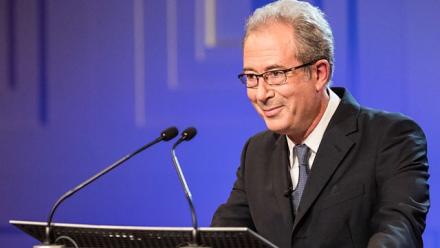
In a wide-ranging talk, given at the BBC as the inaugural Ronnie Barker Comedy Lecture, comedian Ben Elton has spoken out in defence of mainstream studio sitcoms such as Mrs Brown’s Boys and talked about his own career at the BBC from the Young Ones and Blackadder through to Upstart Crow via the less well-received The Wright Way.
If you want to read a full transcript of his talk please click here. But here are some excerpts.
“I was lucky enough to get to know Ronnie (Barker) in his final years and in fact we became quite friendly but the first time I met him was not a very happy occasion. I’d been so excited too. I was at my very favourite event of the year. The BBC Light Entertainment Department Christmas Party! A BBC institution which all who knew it will remember fondly till they crack their final double entendre and join the great studio audience in the sky.
It was a black-tie event. Oh yes, dinner jackets were expected in those days, despite the fact that the party was held in an office. The famed ‘hospitality suite’ on Sixth Floor at TV Centre. Which was the same as all the other offices at TV Centre but with the partition walls removed. Same nylon carpet tiles, periodically punctuated with plug sockets. Same low ceiling with those horrible plaster board panels that you can push out to get to the wiring. Same flouro tube lighting, horrible, even made Bob Monkhouse look pasty. Plus, for a seasonal touch, a magnificent display of paper chains and a tinsel Christmas tree in the corner.
Anyway, after a little while the great man turned to us and looked us up and down.
All eyes turned with him.
“I like you” he said, looking at Rowan.
“I quite like you” he said pointing at Stephen.
Before finally turning to me and saying “But I don’t like you”.
That was it. No “hello” or anything and completely out of the blue.
Then he turned his back.
It was a proper moment. Everyone heard, he’d said it quite deliberately. And I was left stood standing in my rented tux looking like a right arse.
As I say I got to know Ronnie later and we laughed about it but it hurt at the time and I tell the story now because it sort of brings me to the point of this little talk. Such as there is one - which there mainly isn’t because comedy almost by definition defies analysis – But comedy does make people angry, very angry, more so than drama or even politics. Look I know these days everybody’s angry about everything, the Internet has made splenetic fury the new tolerance, but comedy provokes disproportionate fury even in our age of outrage. And interestingly one type of comedy provokes the greatest level of fury of all. The real venom is generally reserved for a certain style of comedy which seems to make quite a large proportion of comedy critics, commentators and consumers very angry indeed. The studio based sit com recorded live in front of an audience. And it is to the defence of that much-maligned art form that I am dedicating this first BBC Ronnie Barker Lecture. The Studio Sit com. Comedy’s whipping boy. Routinely dismissed as Hackneyed. Old fashioned and terminally naff. The Cinderella that so rarely gets to go to the Bafta ball.
Mrs Brown’s Boys is the BBC’s biggest comedy hit in years, it gets 11 million viewers in an environment where 4 is considered a triumph. It also won the Radio Times Readers poll for best sit com of the 21st Century. So, whatever you think of it I hope you’ll agree that by commissioning such a show the BBC was doing its job. Recognising that the whole country pays the licence fee and that quality comedy comes in many guises. Because Mrs Brown is quality comedy, not to everyone’s taste of course but what work of art of any value could possibly be to everyone’s taste? It’s an exuberant, superbly executed celebration of what for want of a better word you might call ‘big comedy’.
A highly talented cast led by an inspired comic star giving an adoring audience a weekly object lesson in big, broad, farcical nonsense. What’s not to respect? But as we have seen the show is afforded very little. Studio based sit com rarely is, at least not in its own day. Oh, it gets respected later, after everyone’s dead, we all know Dad’s Army is a classic now. But when it started the best it got was at best a grudging smile and at worst and angry snarl.
As you get older you realise those are real people’s efforts you’re casually denigrating. And you also find out that it hurts. Which is why at this point in the evening I have to declare a personal interest. The truth is that I am not an unbiased witness. This lecture is not objective. In fact, it’s more subjective than a Donald Trump press briefing. Because it might surprise you to learn that I’ve had one or two bad reviews in my time. Here’s a clip from a sit com I did three years ago which starred the incomparable David Haig as a hapless Health and Safety Officer.
CLIP: The Wright Way.
And here’s just a small selection of the universal phalanx of furious abuse that hit it immediately after the first ep was broadcast.
QUOTE: ‘utter utter crap’.
And believe me, that was one of the better ones. Well maybe it deserved it. Maybe it was that awful. We’ll never know because it disappeared without trace under the weight of the contempt.
So. What is it that defines this thing I’m so anxious to defend? What element links The Goodies to Terry and June?. The Young Ones to On The Buses? They are all recorded live in front of an audience. An exercise in which clearly laughter is the desired aim. Real vocalised laughter, not internalized smirks, not knowing nods. But laughs. Laughs that are recorded and broadcast along with the show. So, is that the problem? Is it laughter which offends in comedy? Strangely I think it is. The principle objection to these comedies is that people are laughing. Why is that? I think it’s because we’re British.
Because the laughter is evidence of effort. The terrible British sin of Going for laughs. Laughs which incidentally will be routinely dismissed as ‘cheap’ and ‘easy’. Laughs which are clear evidence of the greatest comedic crime of all, the crime of Trying to be funny. Because let’s face it, nobody commits a greater sin in the business of comedy than being spotted trying to be funny. But is that really such a despicable ambition? Trying and failing may be a shame but is trying at all so terrible? Surely not. Because without people trying to be funny we’d have had to get along without memories like these….
Basically, what is broadcast is a live theatrical show. This produces an atmosphere very different from the type of feel produced when comedy is created filmicly, using a single camera. Most people tend to think the major difference is the absence of an audience but I think of equal significance is the fact that when a scene is recorded on a single camera it is made in pieces, covering first one character and then another. The characters in a mulit camera studio sit com are really talking to each other in real time. I’m not making a value judgement here, I love and have worked in the single camera environment, I’ve directed two comedy feature films. But I am saying that in the live studio recording you are seeing the actors natural timing, in a filmic sit com you are seeing the editor’s interpretation of it. One style is captured fleetingly on the night, the other is assembled painstakingly in an edit suite.
The sea change occurred in the mid 90’s when suddenly it became fashionable to make sit coms filmicly and without an audience. There was some wonderful stuff, no doubt about that. The sublime Royle Family started it although that was something of a crossover as it remained studio bound but without the live laughter. The real watershed moment came with the brilliant and ground breaking The Office. That and many other shows deserved all the plaudits they get but what began as a fantastic, innovative and refreshing style quickly became a kind of comic orthodoxy and the inexplicable side effect was that the studio sit com became overnight a by word for critical contempt. And it’s the laughter that seems to be so hated! Laughter is hugely irritating.
Apparently, people don’t need ‘canned’ laughter ‘telling’ them if something’s funny. Well I am here to lance the boil of the most corrosive myth in comedy. Because that laughter is not blooming canned! Or at least in my entire thirty-six-year personal experience it hasn’t been, it is simply recorded live. Sure, if the editor is using a second take they might use the laughter from the first. But if anything, the laughter generally has to be turned down rather than up. Because studio nights are not cynical. They are fun, exciting, community events. Is it a coincidence that they fell from grace in the aftermath of the 80’s? The decade in which the individual so firmly replaced the community as the social and political focus of the nation. Yes! I’m blaming Thatch!!
Audience’s laughter is a group activity. A collective act. The shared joy that occurs in the recording of a live comedy is real and that joy somehow manages to make its way across the air waves and into people’s living rooms. The country’s biggest popular comic hits have always been accompanied by laughter. They form an abiding and affectionate collective memory. They are part of what it means to be British. And yet as I have shown, the form is routinely dismissed and often despised."
The Ronnie Barker Comedy Lecture With Ben Elton is on BBC1 on Friday, August 25 at 10.35pm.



